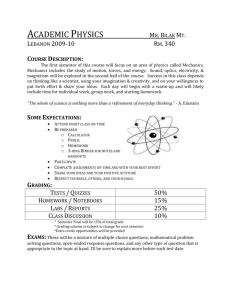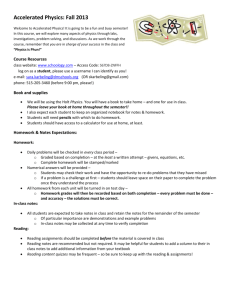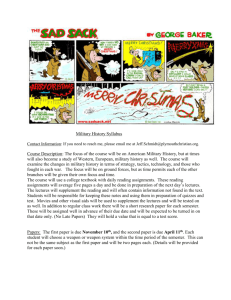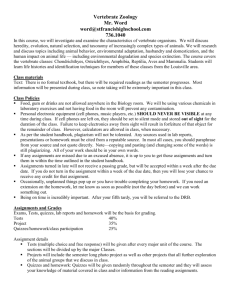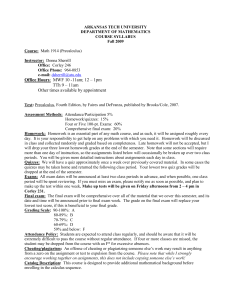Course Specification
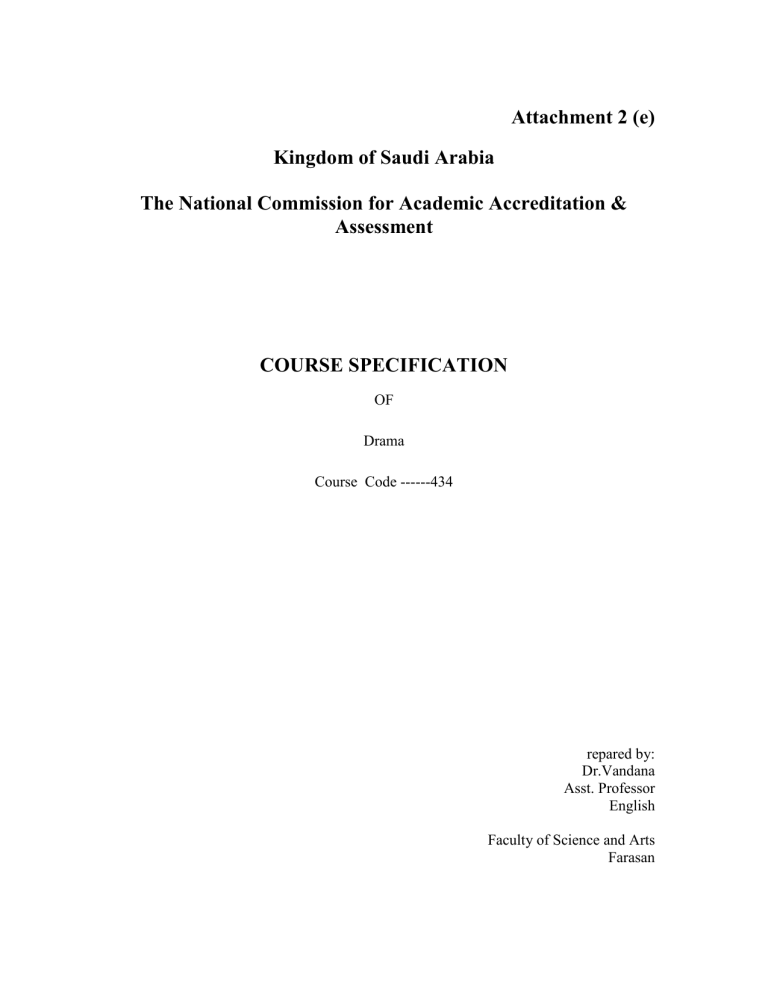
Attachment 2 (e)
Kingdom of Saudi Arabia
The National Commission for Academic Accreditation &
Assessment
COURSE SPECIFICATION
OF
Drama
Course Code ------434 repared by:
Dr.Vandana
Asst. Professor
English
Faculty of Science and Arts
Farasan
Course Specification
Institution : Jazan University
College/Department : Faculty of Science and Arts (Farasan) /English deptt.
A Course Identification and General Informations
1. Course title and code ; : Drama - 434
2. Credit hours : 3 per week
3. Program(s) in which the course is offered. BA (English Honours)
(If general elective available in many programs indicate this rather than list programs)
4. Name of faculty member responsible for the course ; Dr.Vandana
5. Level/year at which this course is offered: Level 7
6. Pre-requisites for this course (if any)
7. Co-requisites for this course (if any)
8. Location if not on main campus : Farasan
B Objectives
1. Summary of the main learning outcomes for students enrolled in the course.
After completing this course, students are expected to:
1.
Understand British playwrights.
2.
Have understanding of human subject &its role in the society.
3.
They are able to do the appreciation of drama .
2. Briefly describe any plans for developing and improving the course that are being implemented. (e.g. increased use of IT or web based reference material, changes in content as a result of new research in the field)
The text books of the plays 1) Dr. Faustus ( Christopher Marlowe ).
2) Importance of being Earnest ( Oscar Wilde ).
Enacting the play remained the main strategy to make them understand the plays.
Class room Quiz and activities .
C.
Course Description ( Note: General description in the form to be used for the Bulletin or
Handbook should be attached )
1. Topics to be Covered
List of Topics No of
Weeks
Contact hours
Dr. Faustus, play ;by Christopher Marlow ; Theme,Character sketch,
&Climax of the play.Critical analyses of the play.
Quizzes,short answers and
moral teachings from the play.
Enacting the play in class in groups.
The Importance of being Earnest : A play by Oscar Wilde
.
Understanding the play.
The summary of the play.
Theme, character sketch & climax of the play.
Quizzes,short answers and moral teachings from the play.
Enacting the play in class in groups.
6
6
18
18
2 Course components (total contact hours per semester):
Lecture: 36 Tutorial: Laboratory: Practical/Field work/Internship
;Enacting the plays.
Other:Performing drama in front of the college.
3. Additional private study/learning hours expected for students per week. (This should be an average
:for the semester not a specific requirement in each week) :
4. Development of Learning Outcomes in Domains of Learning
For each of the domains of learning shown below indicate:
A brief summary of the knowledge or skill the course is intended to develop;
A description of the teaching strategies to be used in the course to develop that knowledge or skill;
The methods of student assessment to be used in the course to evaluate learning outcomes in the domain concerned. a. Knowledge
(i) Description of the knowledge to be acquired:
Expand students understanding the drama skills.
Teach students about the history & origin of plays.
To make them understand the importance of moral standard in day to day life from the story .
To apply dramatic elements to analyse the plays.
To critically analyse dramatic texts.
(ii) Teaching strategies to be used to develop that knowledge
Class lectures with the help of white board and presentations.
Class participation.
Assignments.
Quizzes
Action method i.e. enacting the play.
(iii) Methods of assessment of knowledge acquired
Classroom Participation
Midterms
Quiz
Final Exam
b. Cognitive Skills
(i) Description of cognitive skills to be developed :
Ability to concentrate.
Ability to understand the concepts.
Perception by listening &understanding carefully.
Memorising for long term.
Thinking logically about the knowledge attained.
(ii) Teaching strategies to be used to develop these cognitive skills :
Focus on topic i.e. lecture should be point to point and clear.
Lectures ; To transmit information & promote understanding via explanations &responding to student’s difficulties.
Discussion ;To practice thinking & identifying problems.
Writing ;To develop systematic relation among ideas.
Group Projects ;To develop problem solving attitude.
Repetition of specific points.
Enacting the play.
(iii) Methods of assessment of students cognitive skills
Classroom Participation
Midterms
Assignments
Quizzes
Final Exam c. Interpersonal Skills and Responsibility
(i) Description of the interpersonal skills and capacity to carry responsibility to be developed
Students can participate in class discussion and think critically.
Students can act responsibly and ethically in carrying out individual as well as
group task
Students have necessary skills to communicate, listen, negotiate, and evaluate their strengths and weaknesses as members of a team.
(ii) Teaching strategies to be used to develop these skills and abilities
Counseling of the students regarding any difficulty.
Assignments where much of the most effective learning comes from the student explaining, discussing and defending his own ideas with his peers.
By enacting play in groups and performing the best one on stage.
Discussion with the students.
(iii) Methods of assessment of students interpersonal skills and capacity to carry responsibility
Active classroom participation reflects the student’s ability to keep up with the class schedule.
Assignments will attest to the student’s ability to complete task.
Quiz during the lecture shows their attention.
Dialogue writing & speaking dialogues fluently d. Communication, Information Technology and Numerical Skills
(i) Description of the skills to be developed in this domain.
Students must make their ideas clear to clear to others.
They must express themselves clearly and confidently.
Writing dialogues for play.
Doing make up to justify the character.
(ii) Teaching strategies to be used to develop these skills
Teach students with the help of white board
Dialogue writing
Speaking confidently.
(iii) Methods of assessment of students numerical and communication skills
Classroom Participation
Quizzes ,(written & oral test )
Observations
e. Psychomotor Skills (if applicable)
(i) Description of the psychomotor skills to be developed and the level of performance required
NA
(ii) Teaching strategies to be used to develop these skills
1
2
3.
4
(iii) Methods of assessment of students psychomotor skills
5. Schedule of Assessment Tasks for Students During the Semester
Assess ment
Assessment task (eg. essay, test, group project, examination etc.)
Participation
Midterm1
Class test
Final
Week due
During course
Proportion of Final
Assessment
10%
20%
10%
60%
D. Student Support
1. Arrangements for availability of teaching staff for individual student consultations and academic advice.
(include amount of time teaching staff are expected to be available each week)
Faculty is available for consultation during office hours.
E Learning Resources
1. Required Text(s) : Dr. Faustus.; Importance of being Earnest.
2. Essential References : Internet.
3- Recommended Books and Reference Material (Journals, Reports, etc) (Attach List) :None
4-.Electronic Materials, Web Sites etc :None
5- Other learning material such as computer-based programs/CD, professional standards/regulations
N.A.
F. Facilities Required
Indicate requirements for the course including size of classrooms and laboratories (ie number of seats in classrooms and laboratories, extent of computer access etc.)
1. Accommodation (Lecture rooms, laboratories, etc.)
N.A.
2. Computing resources
Computer facility for students.
3. Other resources (specify --eg. If specific laboratory equipment is required, list requirements or attach list)
N.A
G Course Evaluation and Improvement Processes
1 Strategies for Obtaining Student Feedback on Effectiveness of Teaching
Midterm evaluation instructor’s awareness of the weak and strong points of the class.
End of term college evaluation of course by students (to be collected by the department).
Discussion with the students about problems they faced during course.
2 Other Strategies for Evaluation of Teaching by the Instructor or by the Department
3 Processes for Improvement of Teaching
Training sessions
Workshops to facilitate the exchange of experiences amongst faculty members
Regular meetings where problems are discussed and solutions given
Discussion of challenges in the classroom with colleagues and supervisors
Encouragement of faculty members to attend professional development conferences
Set goals for achieving excellence in teaching at the beginning of each new semester after reviewing last semester’s teaching strategies and results
4. Processes for Verifying Standards of Student Achievement (eg. check marking by an independent member teaching staff of a sample of student work, periodic exchange and remarking of tests or a sample of assignments with staff at another institution)
Check marking of a sample of examination papers either by a resident or visiting faculty member.
Arrang e with another institution to have two common test items included on an exam and compare marks given.
Students who believe they are under graded can have their papers checked by a second teacher.
5 Describe the planning arrangements for periodically reviewing course effectiveness and planning for improvement.
Meetings of faculty members to discuss improvement
Have a curriculum review committee to review the curriculum periodically and suggest improvements.
Changes will be made on the basis of meeting the course objectives and students needs.

